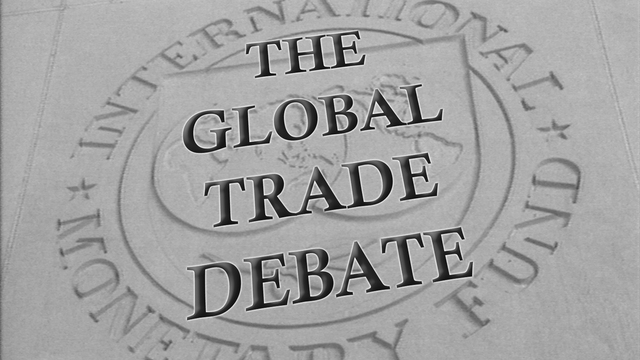the global trade debate
Is globalisation a good thing, or the end of civilisation?
 This punchy documentary looks at the tactics of the anti-globalisation protest movement, and examines the issues driving the world's youth to the streets.
This punchy documentary looks at the tactics of the anti-globalisation protest movement, and examines the issues driving the world's youth to the streets.
During anti-IMF demonstrations in Prague that symbol of globalisation run riot, McDonald's, is ritualistically smashed up. We look at the degree of corporate control exercised by such powerful companies, and ask whether there are other methods of protest that can influence their business practice. Have we reached an age where people dare not speak out against big corporations?
Following the protest juggernaut around the world, we find globalisation is linked with trends which make its critics uneasy, like cultural homogenisation. Globalisation of labour has meant the spread of western culture: Indian call center workers in Delhi tackle English tongue-twisters! On a more serious note, indigenous peoples are being resettled, ridding the world of precious cultures and languages.
We also examine the meaning of globalisation in economic terms, namely trade liberalisation and foreign investment. We find that thanks to trade and investment, more developing countries have closer links to the world economy, but that there are still many abuses of third world labour rights - low wages and the use of child labour. "The poor are to be pitied", says Brian, rescued from a bleach factory by the UN Children's Fund.
There are wide calls for more consideration towards the third world in fixing up some of the problems created by globalisation, from the environment to debt relief. World Bank President James Wolfensohn says much of the protest 'rankles' with him, because the Bank is addressing world poverty. Its involvement with the Global Environment Fund has attracted criticism, but is a step in the right direction.
The globalisation debate has engendered broad consensus on ethical business practise and corporate responsibility. We interview BP on improvements it has made to its environmental practices following pressure from consumers. "This is really about is saving the company, not saving the world", BP admits. We also look at carbon trading as a globalised solution to global warming. Meanwhile US reticence to meet Kyoto emissions targets is certainly economic, as one a US congressman admits: "The American people are not going to commit themselves to a treaty like Kyoto, which will in the end be a massive shift in wealth away from the western democracies over to countries like China, and other developing countries, which are run by dictators and crooks by and large. The American people aren't going to lower our standard of living for that!"
Ironically, if climate change is ignored, the freak weather it causes may wash a torrent of refugees towards developed nations, added to the already huge surge in economic migration. The global asylum system is creaking under the strain of massive movements of up to 21m migrants a year. It is a household topic in parts of China, where many are rich thanks to money sent from relatives working illegally overseas. Since economic migrants generally do the dirty work, we ask whether globalisation calls for a world without borders, where not only trade is free, but people are free to migrate.
From cleaner energy to an end to the use of child labour, consumers and governments alike must continue to push for responsible business practice. Whilst the challenge is to find new ways of giving global trade a more humane face, the developing world's entrepreneurs remain upbeat. "Every government, all people love to see the prosperity of business. You may have political problems, but nobody wants business problems" says the CEO of Alibaba.com in China.
Perhaps the developed world needs to re-examine its own obsession with consumerism, rather than seek to reverse globalisation and deprive poorer nations of access to jobs, goods and opportunity. non-theatrical rights unavailable in the US.
Produced by ABC Australia and Journeyman Pictures
FULL SYNOPSIS
